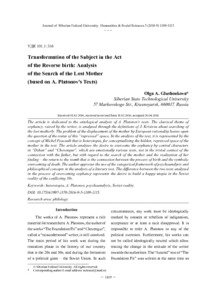Transformation of the Subject in the Act of the Reverse birth: Analysis of the Search of the Lost Mother (based on A. Platonov’s Texts)
Скачать файл:
URI (для ссылок/цитирований):
https://elib.sfu-kras.ru/handle/2311/20259Автор:
Glushenkova, Olga A.
Глушенкова, О.А.
Дата:
2016-05Аннотация:
The article is dedicated to the ontological analysis of A. Platonov’s texts. The classical theme of
orphancy, raised by the writer, is analyzed through the definitions of J. Kristeva about searching of
the lost motherly. The problem of the displacement of the mother by European rationality leaves open
the question of the status of this “repressed” space. In the analysis of the text, it is represented by the
concept of Michel Foucault that is heterotopia, for conceptualizing the hidden, repressed space of the
mother in the text. The article analyzes the desire to overcome the orphancy by central characters
in “Dzhan” and “Chevengur”, which are emotionally various texts, not in the trivial context of the
connection with the father, but with regard to the search of the mother and the realization of her
finding – the return to the womb that is the connection between the process of birth and the symbolic
overcoming of death. The author approves the use of the categorical framework of psychoanalysis and
philosophical concepts in the analysis of a literary text. The difference between the two texts analyzed
in the process of overcoming orphancy represents the desire to build a happy utopia in the Soviet
reality of the conflicting 30s Статья посвящена онтологическому анализу текстов А. Платонова. Классическая
тема сиротства, поднимаемая писателем, анализируется через понятийный аппарат
Ю. Кристевой о поиске утраченного материнского. Проблема вытеснения европейской
рациональностью материнского оставляет открытым вопрос о статусе этого
«вытесненного» пространства. При анализе текста оно представлено понятием
М. Фуко – гетеротопия, для концептуализации скрытого, вытесненного пространства
материнского в тексте. Анализируется стремление преодоления сиротства главными
героями в эмоционально различных текстах “Джан” и “Чевенгур” не в тривиальном
контексте соединения с отцом, а с позиции поиска матери и реализации ее нахождения –
возвращения в утробу – замыкания процесса рождения и символического преодоления
смерти. Апробируется использование категориальной базы психоанализа и философских
понятий при анализе литературного текста. Различие двух анализируемых текстов в
процессе преодоления сиротства репрезентирует стремление к построению счастливой
утопии в советской действительности противоречивых 30-х годов

